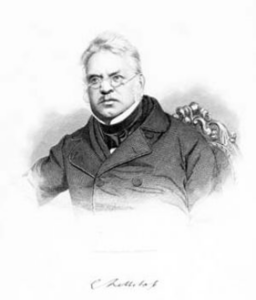Warrior's sense of foreboding
(Poet's title: Kriegers Ahnung)
Set by Schubert:
D 957/2
[August 1828]
Part of 13 Lieder nach Gedichten von Rellstab und Heine (“Schwanengesang”), D 957
In tiefer Ruh liegt um mich her
Der Waffenbrüder Kreis.
Mir ist das Herz so bang und schwer,
Von Sehnsucht mir so heiß.
Wie hab ich oft so süß geträumt
An ihrem Busen warm,
Wie freundlich schien des Heerdes Glut,
Lag sie in meinem Arm.
Hier, wo der Flammen düstrer Schein
Ach nur auf Waffen spielt,
Hier fühlt die Brust sich ganz allein,
Der Wehmut Träne quillt.
Herz, dass der Trost dich nicht verlässt,
Es ruft noch manche Schlacht. –
Bald ruh ich wohl und schlafe fest,
Herzliebste – gute Nacht!
Lying around me in deep repose
Is the circle of my brothers in arms;
My heart feels so anxious and heavy,
I am so hot with longing.
How often I have dreamt so sweetly
On her warm breast!
How friendly the glow of the fire appeared
When she was lying in my arms!
Here, where the dismal glow of the flames
Plays only on our weapons,
Here my breast feels totally alone and
Tears of melancholy well up.
Heart! May solace never abandon you!
Many a battle is still calling you. –
I shall soon rest well and sleep tight,
Dearest heart – goodnight!
All translations into English that appear on this website, unless otherwise stated, are by Malcolm Wren. You are free to use them on condition that you acknowledge Malcolm Wren as the translator and schubertsong.uk as the source. Unless otherwise stated, the comments and essays that appear after the texts and translations are by Malcolm Wren and are © Copyright.
☙
Themes and images in this text:
Arms and embracing Being solitary, alone and lonely Chest / breast Circles Farewell and leave taking Fire Going to bed Hearts Hearths and fireplaces Longing and yearning Melancholy Rest Serenades and songs at evening Tears and crying War, battles and fighting
It is not at all surprising that this soldier’s heart is anxious and heavy. It is the night before a battle and the prospect of imminent death (or even brutal, agonising injuries) must be terrifying and disturbing. So, what IS surprising is the fact that his comrades bivouacking in the defensive circle around him seem to be sleeping soundly. Of course, they may just be pretending or they are better at hiding their fear. They might be older, more experienced soldiers who have developed a thicker skin, but that only makes this poor soldier feel worse. He knows that he should not be feeling so anxious and so lonely, and their ability to cope only intensifies his sense of isolation.
What goes through the head of such a soldier during the long, sleepless hours before the horror of the battle? Ludwig Rellstab, the author of this text, was just too young to be able to answer this question from personal experience, since he joined the cadet school in Berlin in 1815 (the year of the Battle of Waterloo) and did not become an Officer until 1818 (at the age of 19). He left the army in 1821, but he must have been trained by and worked alongside many soldiers who had been active in the Napoleonic Wars. Was he perhaps thinking of a particular story he had been told when he wrote Kriegers Ahnung?
It makes sense that a young man in such a situation would think mostly about either his girlfriend or his mother. There might be a few (like some of the soldiers in Tolstoy’s War and Peace) who are keen to prove themselves in battle and buzzing with excitement, but these are surely in the minority. Far too many young men called on to fight have no inherent desire to do so and feel the loss of home and security intensely. Rellstab’s soldier sees the flames of the campfire and feels an acute sense of the loss of the warm fireside where he used to sit or lie with his wife or girlfriend. The memory of warmth makes him feel cold, despite the fire. The flickering flames then illuminate the steel weapons lying around. Whether they are swords, spears or guns, he experiences them as offensive not defensive. The lad becomes even more aware of what injuries might befall him in the morning. The pain and the loss that are in store for him are his alone. The circle of brothers will not feel anything like the same lacerating agony.
He knows that he is expected to pluck up courage. He knows that there is a chance that he will survive to fight many another battle, but somehow another part of him knows the opposite. The rest that he desires is going to be all too peaceful; the only sleep that is going to come to him is going to be in an unmarked grave.
☙
Original Spelling and note on the text Kriegers Ahnung In tiefer Ruh liegt um mich her Der Waffenbrüder Kreis; Mir ist das Herz so bang und schwer, Von Sehnsucht mir so heiß. Wie hab' ich oft so süß geträumt1 An ihrem Busen warm! Wie freundlich schien des Heerdes Gluth, Lag sie in meinem Arm! Hier, wo der Flammen düstrer Schein Ach nur auf Waffen spielt, Hier fühlt die Brust sich ganz allein, Der Wehmuth Thräne quillt. Herz! Daß der Trost Dich nicht verläßt! Es ruft noch manche Schlacht. - Bald ruh' ich wohl und schlafe fest, Herzliebste - Gute Nacht! 1 Schubert seems to have changed 'geruht' (rested) to 'geträumt' (dreamt)
Confirmed by Peter Rastl with Gedichte von Ludwig Rellstab. Erstes Bändchen. Berlin, bei Friedrich Laue. 1827, page 105; and with Mitternachtblatt für gebildete Stände. Herausgegeben von Müllner. 1826, Zweiter Band. Braunschweig, bei Friedrich Vieweg. No. 78. Braunschweig, am 30. Juni 1826, page 312.
To see an early edition of the text, go to page 105 [121/265] here: http://digital.ub.uni-duesseldorf.de/download/pdf/3376501


